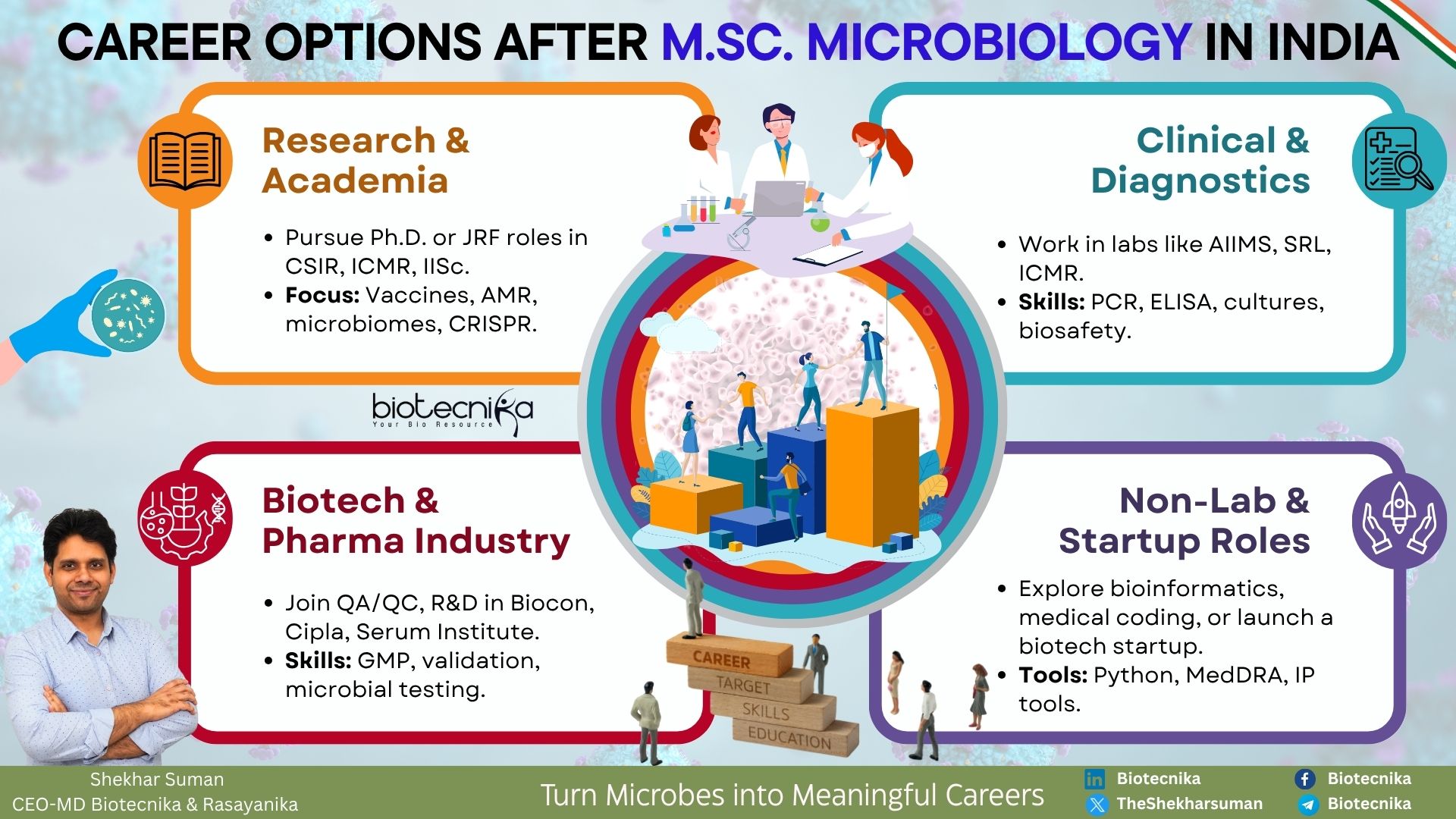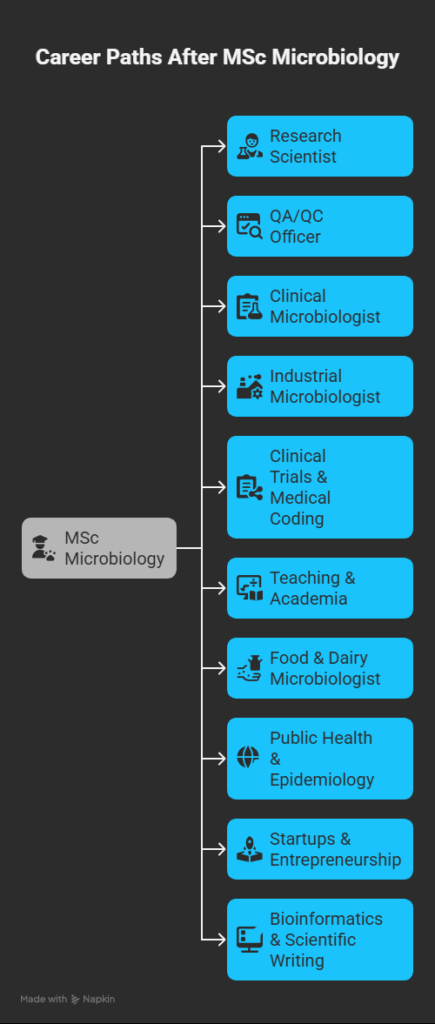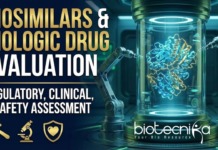Career Options After MSc Microbiology in India
Visualize yourself in your dream Research laboratory, gazing through the lens of a microscope. You see the still Petri dish, but it has a million microscopic lives. There could be Bacteria, Viruses, or Fungi, each carrying its potential and properties. Have you thought that these microbes could help us tackle concerns such as Antibiotic Resistance? Or could it be the solution to safer food, faster vaccines, or cleaner water?
Since you’ve completed your MSc Microbiology in India, you understand the Microbial world in depth, as you’ve interacted with it, as well as unlocked its power to nourish, protect, and heal lives.
In today’s era, people are more conscious than ever of disease prevention, Biotechnology innovations, and infection control. Your MSc Microbiology degree can be the savior, standing at the heart of novelty and innovation. Microbiologists are at the forefront of the world, with diverse roles in Industrial Production, Public Health, Medical Research, and Food Safety.
With an MSc Microbiology in India, you have gained access to impactful and diverse scientific fields globally. Microorganisms are present everywhere, from climate solutions to disease control; your Microbiology expertise is essential. In India, there’s a rise in the Research ecosystem, and the Biotechnology sector is growing. With the exponential growth of the Biotechnology sector, there’s a wide range of career opportunities for enthusiastic Microbiology graduates.
Whether you want to explore the Biotechnology field, or are driven by curiosity, a vision to develop your innovation, or a desire to enhance Public health, then this guide is for you.
Career Options After MSc Microbiology in India
- Research Scientist
This role is ideal for people who are academic explorers and have Curious minds.
Microbiology Research Scientists work on developing Antibiotics and Vaccines, as well as analysing the roles of Microbes in Environmental Sustainability and Agriculture.
Their responsibilities primarily include working on Microbial Genetics, pathogen experiments, publishing Research papers, investigating Drug resistance, contributing to innovations in CRISPR (Clustered regularly interspaced short palindromic repeats), AMR (Antimicrobial Resistance), Synthetic Biology, and Microbiomes, as well as global project collaborations.
You should explore career roles in Academics and Institutions like:
- CSIR (Council of Scientific & Industrial Research)
- DBT (Department of Biotechnology),
- ICMR ( Indian Council of Medical Research),
- IISc (Indian Institute of Science) Bengaluru,
- BARC (Bhabha Atomic Research Centre),
- NII (National Institute of Immunology) Delhi,
- DRDO (Defence Research and Development Organisation),
- ICAR (Indian Council of Agricultural Research),
- THSTI (Translational Health Science and Technology Institute),
- NCBS (National Centre for Biological Sciences) Pune,
- NIBMG (National Institute of Biomedical Genomics), and
- TIFR (Tata Institute of Fundamental Research) Mumbai,
To get into these Institutes, one must qualify for examinations such as:
- GATE (Graduate Aptitude Test in Engineering),
- CSIR-NET (Council of Scientific and Industrial Research National Eligibility Test),
- ICMR-JRF (Indian Council of Medical Research – Junior Research Fellowship), for Project Associate roles or JRF (Junior Research Fellow), or can consider pursuing a PhD (Doctor of Philosophy) for long-term career growth.
The major trending fields are CRISPR, Gene Editing, Antimicrobial Resistance, Environmental Microbiology, and gut Microbiome Research.
- Quality Assurance (QA) or Quality Control (QC) Officer
This role is ideal for Detail-oriented and documentation experts in Biotechnology and Pharmaceutical manufacturing or R&D (Research and Development).
In the Biotechnology and Pharmaceutical industries, Microbiologists in QA or QC play a crucial role in Regulatory Compliance and maintaining product as well as ingredient safety.
They are responsible for monitoring sterility in manufacturing environments, ensuring that documentation complies with GLP (Good Laboratory Practices), ISO (International Organization for Standardization) standards, as well as GMP (Good Manufacturing Practices), and performing Microbial testing of raw materials as well as final products.
Some top companies recruiting QA/QC Officers are Biocon, Serum Institute of India, Dr. Reddy’s, Cipla, Zydus Lifesciences, and Aurobindo Pharma.
Obtaining Certifications in ISO 13485, GMP compliance, ISO 9001, validation protocol knowledge, and Regulatory Affairs is highly beneficial from an Employer’s point of view..
- Diagnostic Lab Expert or Clinical Microbiologist
It is ideal for Healthcare contributors and Applied Science enthusiasts, and assists in infection control and disease diagnosis.
They primarily work in NABL-accredited laboratories (National Accreditation Board for Testing and Calibration Laboratories), including SRL, Metropolis, Dr. Lal PathLabs, or in hospitals like PGIMER (Postgraduate Institute of Medical Education and Research) and AIIMS (All India Institute of Medical Sciences), as well as public health laboratories under the NCDC or ICMR.
Their primary duties revolve around performing PCR (Polymerase Chain Reaction), conducting microbial cultures, performing antibiotic sensitivity testing and ELISA (Enzyme-Linked Immunosorbent Assay), maintaining biosafety practices, and supporting disease outbreak investigations.
A professional with an MSc Microbiology in India can secure this role through Clinical fellowships, hands-on laboratory experience, collaboration with MD Microbiologists for specific hospital-based roles, and certification in Biosafety Levels.
- Bioprocess Specialist or Industrial Microbiologist
It is ideal for practical problem-solvers in industrial Biotechnology
Microbiologists with an MSc Microbiology in India contribute significantly to industries such as biotechnology, Pharmaceuticals, Dairy, Agriculture, and Enzyme production.
You may work at companies such as Novozymes, Bharat Biotech, Amul, ITC, Syngene, or Godrej Agrovet.
To succeed in this field, develop skills in Bioprocess Technology, Fermentation, SOP (Standard Operating Procedure) Documentation, and scale-up techniques.
- Clinical Trials, Pharmacovigilance & Medical Coding
It is ideal for Non-laboratory professionals who have expertise in Regulation and Data.
This role supports healthcare innovation without requiring direct laboratory work.
In Clinical Trials, the professional works with Regulatory Compliance, protocol monitoring, as well as design. In Pharmacovigilance, you monitor and report adverse drug reactions. Medical coding involves assigning standardized codes, such as ICD-10, CPT, or MedDRA, to Clinical Data.
Employers in this domain include Parexel, IQVIA, Cognizant, Accenture, and TCS.
Valuable skills and certifications include proficiency in SAS programming and ICD-10, as well as experience with Oracle Clinical, MedDRA, and Argus Safety.
- Academia & Teaching
If you aspire to inspire, a career in academia would be a rewarding choice.
With an MSc Microbiology in India, you can teach at Universities and Colleges or even join leading EdTech platforms such as BioTecNika.
To enter this field, candidates should qualify for the UGC-NET or SET exams, pursue a PhD under UGC (University Grants Commission) norms, and either build a strong teaching portfolio or create e-learning content.
- Dairy & Food Microbiologist
Microbiologists in this field ensure the quality as well as the safety of products for consumption.
The primary work involves performing TVC tests and hygiene audits, conducting QA in Fermented and Dairy product lines, as well as detecting contaminants and pathogens in food samples.
Employers include Nestlé, Amul, Britannia, GSK Consumer, Mother Dairy, and regulatory bodies such as the FSSAI.
Certifications such as HACCP (Hazard Analysis and Critical Control Points) and FSSAI (Food Safety and Standards Authority of India) licensing, as well as ISO 22000, are essential for career advancement and growth.
- Epidemiology & Public Health
One of the Career Options After MSc Microbiology in India is getting into Epidemiology & Public Health. Professionals with an MSc Microbiology in India, who are associated with Epidemiology and Public Health, play a pivotal role in disease surveillance and public health policy.
You can work with organizations such as WHO India, UNICEF (the United Nations International Children’s Emergency Fund), ICMR, NCDC (National Centre for Disease Control), or various State Health Missions.
Pursuing an MPH (Master’s in Public Health) and gaining skills in Epidemiology, Biostatistics, and GIS mapping can strengthen your profile.
Key areas of impact include disease outbreak response, health program design, and evidence-based policy making.
- Startups & Entrepreneurship
With government support for innovation, Microbiologists have exciting startup opportunities.
Your venture could focus on rapid Diagnostics, Biosensors, Probiotic formulations, Bioremediation solutions, or Agricultural bio-inputs.
Support is available through various initiatives, including BIRAC (Biotechnology Industry Research Assistance Council), Startup India, CCAMP (Centre for Cellular and Molecular Platforms), IKP Knowledge Park, and the Atal Innovation Mission.
- Bioinformatics, Patent Analysis, & Scientific Writing
This path integrates Microbiology with writing, Data interpretation, and Intellectual Property.
You can pursue roles as a scientific or regulatory writer, a bioinformatics analyst specializing in microbial genomics, or a Patent Analyst evaluating innovations.
Key skills include proficiency with tools such as MEGA (Molecular Evolutionary Genetics Analysis), BLAST (Basic Local Alignment Search Tool), Python, and R. Familiarity with databases, including Espacenet and WIPO (World Intellectual Property Organization), is also essential, as is strong scientific communication skills.
Your MSc Microbiology in India is more than just a degree; it’s an entry ticket into solving some of the most critical global challenges. Whether you’re exploring antibiotic resistance, ensuring food safety, decoding genomes, or mentoring the next generation, your work matters.
To maximize your impact and make an impression in this field, stay informed on scientific trends such as microbiomes, AMR, and CRISPR. An aspiring professional should consider combining Microbiology with complementary fields such as Entrepreneurship and Data Science. One should upskill through high-skilled certifications and courses, as well as network through seminars and platforms such as LinkedIn.
In a world shaped by the unknown, your knowledge and expertise as a Microbiologist hold the power to innovate, lead, and heal. Step forward with confidence, because your future in Microbiology is limitless!
Career Options After MSc Microbiology in India – Latest Article






























